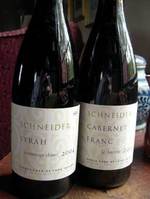North Fork Negociants Release First Estate-Grown Wines
Several of Long Island’s smallest wine producers are Negociants. Negociants buy grapes from a local grower, then make, age, blend and bottle wine under their own label. This practice is common in many wine-producing regions, particularly in Burgundy, home to many well-known negoicant labels like Louis Jadot and Duboeuf. It’s an attractive endeavor to many winemakers because it can be difficult, from a financial perspective, to plant/grow/maintain a vineyard as well as buy all equipment necessary to make and bottle a finished wine.
In the United States, negociant-made wines have the words “produced and bottled by” on the label, which indicate that at least the fermentation and subsequent production was done by the producer or company. If you see “estate bottled,” that means that the grapes were grown, fermented, and the wine bottled on the owner’s property. Phrases such as “cellared and bottled by” or “made and bottled by” are fundamentally meaningless.
Schneider Vineyards, founded in 1994 by Bruce and Christiane Schneider, has operated as a negociant since its inception, buying grapes from growers on the North Fork. Their first wines were released in 1997 and were quite popular among wine drinkers and wine critics alike. Then, in 2000, the Schneiders planted their own 22-acre estate vineyard on Roanoke Avenue in Riverhead and the first wines made from 100-percent estate-grown grapes were released just a few weeks ago.
Unlike their first wines, which were bottled in 1994 and released three
years later in 1997, these first estate releases were bottled in 2004
and spent only about a year in the bottle before release. And, while
the wines are flavorful and show potential, their youth is evident.
Many experts feel that most red wines aren’t “ready” until at
least five years after their vintage date and that notion is supported
by these early-release wines. Far from flawed, they will likely improve
and blossom with time.
The Schneider Vineyards 2004 Cabernet Franc Le Breton ($25)
was fermented at cool temperatures and blended with 10 precent dry rosé
of Cabernet Franc. It is medium garnet in the glass and abundantly
aromatic, with a nose dominated by black pepper with subtle notes of
blackberry and cherry in the background. This wine tastes as young as
it is, but is intriguing with great acidity, some mineral character and
a lingering finish. If fruity reds are your favorite, this may not suit
you, however. Buy a few bottles and lay them down for at least a year
or two. 360 cases were produced.
Slightly more ready for drinking now, the Schneider Vineyards 2004 Syrah Hermitage Clones ($25)
is much less aromatic with only hints of red berries and spice on the
nose. Medium bodied with nice acidity, but none of the jammy juiciness
you find in warm-climate Syrah/Shiraz, this wine shows nice balance
between fruit, earth and spice. Cool-climate syrah can be a real treat,
so this may be worth waiting a few years for. 240 cases were produced.
These wines, along with Schneider Vineyards’ Potato Barn Red, a
tasty blend of Merlot and Cabernet Franc, are available at both The
Tasting Room locations.
Technorati tags: food & drink | wine | tasting notes | long island
(This story appeared in the 11/4/05 issue of Dan’s Papers)

